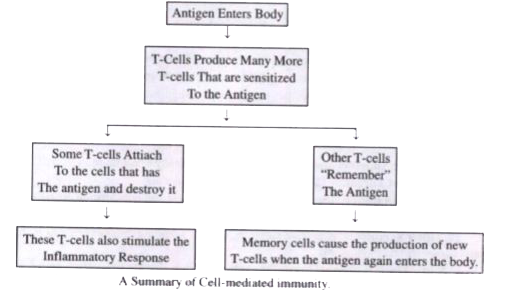What is an immune system? Write all you know about cell mediated immune system.Solution in Punjabi
The human immune system comprises lymphoid organs, tissue cells and soluble molecules such as anti-bodies. The immune system protects the body. This also plays an important role in allergic reactions, auto-immune diseases and organ transplantation.
(i) Cell-mediated Immunity (CMI). T lymphocytes, after their origin in the bone marrow, first migrate to the thymus gland. Here they divide rapidly and develop extreme diversity for reacting against different specific antigens. These different types of processed T lymphocytes now leave the thymus and like B lymphocytes migrate to the lymphoid tissue throughout the body.
The cell mediated immunity is the responsibility of cytotoxic T cells (a sub group of T cells) ruther than B cells and antibodies. An activated cytotoxic T cell is specific to a target cell that has been infected, and kill the target cell. This prevents the completion of life cycle of the pathogen because it depends on an intact host cell. Cytotoxic T cells also kill the cancer cells.
The first description of a CMI response was the observation by Jenner (1798). The immune response to tuberculin (protein extract of tubercle bacillus) was observed by Robert Koch in 1890. Thereafter the tuberculin test became a general model or example for delayed hypersensitiviiy (DH). The tern delayed hypersensitivity refers to the appearance of skin lesion 48-72 hours after adminstration of the antigen. The cellular basis of delayed hypersensitivity was shown by Landsteiner and Chase (1942).
Biologically active substances released by activated T lymphocytes are called lymphokines. They are regulatory proteins whose main function appears to be regulation of immune response and growth and functions of cells of the reticuloendothelial system, t.g., macrophages, phagocytic macrophages which are present in linings of sinuses and in reticulum of various organs and tissue (spleen, liver, lymph nodes, bone marrow connective tissue, etc.)
CMI protects against fungi, most of the viruses and intracellular bacterial pathogens like M. leprae, M. tuberculosis and Salmonella and parasites like Leishmania and Trypanosomas. It also participates in allograft rejection, graft versus host reaction, delayed hypersensitivity and certain autoimmune diseases. It provides immunity against cancer.

Topper's Solved these Questions
- HUMAN HEALTH AND DISEASEBOOK - BETTER CHOICE PUBLICATIONCHAPTER - HUMAN HEALTH AND DISEASEEXERCISE - LONG ANSWER TYPE QUESTIONS (MOST EXPECTED QUESTIONS)
12 Videos
- HUMAN HEALTH AND DISEASEBOOK - BETTER CHOICE PUBLICATIONCHAPTER - HUMAN HEALTH AND DISEASEEXERCISE - SHORT ANSWER TYPE QUESTIONS(MOST EXPECTED QUESTIONS)
9 Videos
- EVOLUTION BOOK - BETTER CHOICE PUBLICATIONCHAPTER - EVOLUTION EXERCISE - LONG ANSWER TYPE QUESTIONS (5 Marks) (MOST EXPECTED QUESTIONS)
13 Videos
- HUMAN REPRODUCTIONBOOK - BETTER CHOICE PUBLICATIONCHAPTER - HUMAN REPRODUCTIONEXERCISE - LONG ANSWER TYPE QUESTIONS
40 Videos
Similar Questions
Write the causative organism, mode of infection, symptoms and preventive measures of the disease pertussis.
View SolutionDraw a well-labelled diagram of an antibody molecule.
View SolutionExplain Human Evolution.
View SolutionWhere does Oogenesis occur in humans? Describe the stages of the process.
View Solution(A) : Plama cells of out immune system are immoral.
(R): These cells are responsible for cell-mediated immunity.
View Solutionकोशिका - मध्यस्थीय तथा प्रतिरक्षी -मध्यस्थीय इम्यून प्रतिरक्षा को समझाते हुए इनके अन्तर को स्पष्ट कीजिए ।
View SolutionThymus derived cells forming part of cell mediated immune system are
View Solutionमानव शरीर में प्रतिरक्षी तंत्र में कौन-सी कोशिका, कोशिका मध्यवर्ती प्रतिरक्षी अनुक्रिया में योगदान देती है ?
View SolutionWhich lymphocytes form the cell-mediated immune system?
View SolutionWhat is cell-mediated immunity.
View SolutionThymus derived cells forming part of cell mediated immune system are
View SolutionWhich lymphocytes form the cell mediated immune system ?
View SolutionName the specialized cells which form cell mediated immune system.
View SolutionName the specialized cells which from antibody mediated immune system.
View SolutionDefine immunity. Write about the cells of immune system. Name two types of immune systems of body.
View SolutionWhat is immunity ? Give an account of cell-mediated immunity.
View Solution
